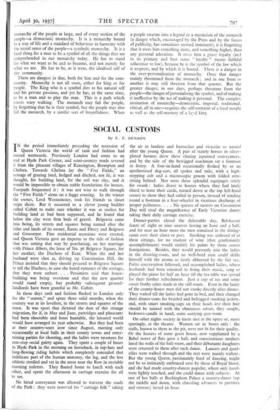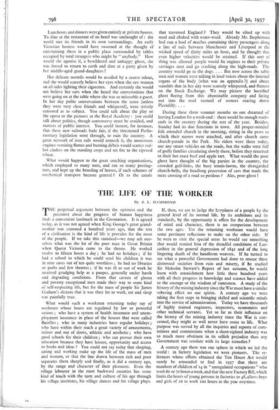SOCIAL CUSTOMS
By E . F. BENSON
Ithe period immediately preceding the accession of 1 Queen Victoria the world of rank and fashion had moved westwards. Previously London had come to an end at Hyde Park Corner, and semi-country roads severed it from the pleasant villages of Kensington, Brompton and Chelsea. Towards Chelsea lay the " Five Fields," an acreage of grazing land, hedged and ditched, not fit, it was thought, for building land, for the soil was clay, and it would be impossible to obtain stable foundations for houses. Footpads frequented it : it was not wise to walk through the "Five Fields " alone on a foggy evening. In the winter the owner, Lord Westminster, took his friends to shoot snipe there. But it occurred to a clever young builder called Cubitt to make sure whether it was as useless for building land as had been supposed, and he found that below the clay were firm beds of gravel. Belgravia came into being, its streets and squares being named after the tides and lands of its owner, Eaton and Ebury and Belgrave and Grosvenor. Fine residential mansions were erected, and Queen Victoria gave an impetus to the tide of fashion that was setting that way by purchasing, on her marriage with Prince Albert, the lease of No. 36 Belgrave Square, for her mother, the Duchess of Kent. When she and her husband were shot at, driving up Constitution Hill, the Prince insisted that they should proceed to Belgrave Square to tell the Duchess, in case she heard rumours of the outrage, that they were unhurt. . . . Pessimists said that house- building was being overdone and that the new quarter would stand empty, but probably subsequent ground- landlords have been grateful to Mr. Cubitt.
In those days rank and fashion flocked to London only for the " season," and spent three solid months, when the country was at its loveliest, in the streets and squares of the town. It was sport that dictated the date of this strange migration, for if,. in May and June, partridges and pheasants had been shootable and foxes huntable, the leisured world would have arranged its year otherwise. But they had been at their country-seats now since August, meeting only occasionally at local balls in their county towns and enter- taining parties for shooting, and the ladies were ravenous for non-stop social gaiety again. They spent a couple of hours in Hyde Park in the morning on horseback, in top-hats and long-flowing riding habits which completely concealed that indelicate part of the human anatomy, the leg, and the less athletic strolled and sat in the areas near the Row in enviable morning toilettes. They floated home to lunch with each other, and spent the afternoon in carriage exercise for all to see.
No hired conveyance was allowed to traverse the roads of the Park : they were reserved for " carriage folk " taking the air in landaus and barouches and victorias so named after the young Queen. A pair of stately horses in silver- plated harness drew these shining japanned conveyances, and by the side of the bewigged coachman sat a footman in livery. A four-in-hand occasionally flashed by or an apotheosised dog-cart, all spokes and rails, with a high- stepping cob and a microscopic groom with folded arms sitting behind. Nor were these splendid equipages solely for swank : ladies drove to houses where they had lately dined to leave their cards, turned down at the top left-hand corner to show they had called in person, instead of sending round a footman in a four-wheeler in vicarious discharge of proper politeness. . . . No queues of motors on Coronation Day will rival the magnificence of Early Victorian dames taking their daily carriage exercise.
Dinner-parties closed the delectable day, Belshazzar feasts of eight or nine courses lasting an hour and a half, and for near an hour more the men remained in the dining- room over their claret or port. Smoking was unheard of at these sittings, for no student of wine (that gentlemanly accomplishment) would stultify his palate by those coarse fumigations. Besides, they would presently join the ladies in the drawing-room, and no well-bred man could defile himself with the aroma so justly abhorred by the fair sex. Polite conversation followed, and accomplished ladies, whose husbands had been enjoined to bring their music, sang or played the piano for half an hour till the tea-table was spread for their further refreshment. Just a cup of tea and some sweet frothy cakes made in the still-room. Even in the laxity of the county-house men did not smoke directly after dinner. They waited till the ladies had gone to bed, and then changed their dinner-coats for braided and befrogged smoking jackets, and, with smart smoking-caps on their heads lest their hair should be tainted with the obnoxious odour, they sought, bedroom-candle in hand, some outlying gun-room.
On other nights society in tiaras met at the opera or, more sparingly, at the theatre. Women sat in boxes only : the stalls, known to them as the pit, were not fit for their quality. Or the hostess of some great house, now supplanted by a Babel tower of flats gave a ball, and conscientious mothers lined the walls of the ball-room, and their debutante daughters were returned to them after each dance. Lancers and quad- rilles were walked through and the rest were mainly waltzes. But the young Queen, passionately fond of dancing, might not be so intimately embraced save by those of Royal blood, and she had made country-dances popular, where only hands were lightly touched, and she could dance with subjects. At one of her balls at Buckingham Palace a country-dance (up the middle and down, with chasseing advances to partners and retreats) lasted an hour. Luncheons and dinners were given entirely at private houses. To dine at the restaurant of an hotel was unthought of : the world met its friends in its own surroundings. An early Victorian hostess would have swooned at the thought of entertaining them in a public place surrounded by tables occupied by total strangers who might be " anybody." How would she agonise if, a bewildered and unhappy ghost, she was forced to return to earth and dine at a party given by her middle-aged grand-daughters !
Her delicate nostrils would be assailed by a coarse odour, and she would scarcely believe her eyes when she saw women on all sides lighting their cigarettes. And certainly she would not believe her ears when she heard the conversations that were going on at the table where she was so miserable a guest. In her day polite conversations between the sexes (unless they were very close friends and whispered), were strictly censored as to subject. You could talk about the play or the opera or the pictures at the Royal Academy : you could talk about politics, though controversy must be avoided, and matters of public interest. You could lament, for instance, that these new railroads bade fair, if the threatened Parlia- mentary legislation went through, to ruin the country. A great network of iron rails would enmesh it, the monstrous engines vomiting flames and burning debris would scatter red- hot cinders on the standing crops and set fire to the ripened wheat.
What would happen to the great coaching organisations, which employed so many men, and ran so many posting- inns, and kept up the breeding of horses, if such schemes of mechanical transport became general ? Or to the canals that traversed England ? They would be silted up with mud and choked with water-weed. Already Mr. Stephenson had run a load of coaches containing thirty passengers along a line of rails between Manchester and Liverpool at the wicked speed of thirty miles an hour, and he thought that even higher velocities would be attained. If this sort of thing was allowed people would fix engines to their private carriages next and go crashing along the high-roads. The country would go to the dogs. . . . But now across the table men and women were talking in loud voices about the internal organs of the body (what was an appendix ?) and about scandals that in her day were scarcely whispered, and flutters on the Stock Exchange. We may picture the horrified ghost fleeing from this abominable company and faring out into the mad turmoil of motors roaring down Piccadilly. . . .
During these three summer months no one dreamed of leaving London for a week-end : there would be enough week- ends in the country during the rest of the year. Besides; Sunday had its due functions in town. All proper-minded folk attended church in the morning, sitting in the pews to which their names were attached, and after church came church-parade in the Park. No riders were there today, nor any smart vehicles on the roads, but the walks were full of godly families circulating slowly there, before they returned to their hot roast beef and apple tart. What would the poor ghost have thought of the big parties in the country, the crowded golf-links, the busy tennis-lawns, the disregarded church-bells, the headlong procession of cars that made the mere crossing of a road so perilous ? Alas, poor ghost !



































































 Previous page
Previous page